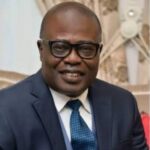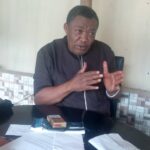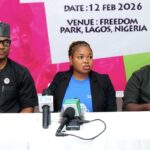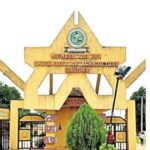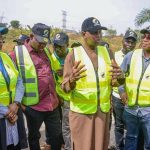… Restates Commitment To Reforms, Diaspora Engagement
By Chidi Ugwu
The Governor of the Central Bank of Nigeria, Mr. Olayemi Cardoso, has canvassed stronger economic ties with the Middle East and the Nigerian diaspora community in the region.
Speaking during a meeting with Talal Al-Humond, the Assistant Governor for Monetary Affairs, Saudi Arabia Central Bank – SAMA, on the sideline of the just-concluded inaugural Conference on Emerging Markets Economies organised by the Ministry of Finance, Saudi Arabia, and the International Monetary Fund (IMF) Regional Office in Riyadh, Mr. Cardoso said there were lessons to be learned from Saudi Arabia in terms of infrastructural development and tourism.
According to him, Saudi Arabia’s dedication to diversifying its economy through innovative environmental projects, large-scale transformation, and tourism investment is essential for development.
Mr. Cardoso also reaffirmed his dedication to collaborating with the Nigerian Diaspora community in the Middle East to improve remittance flows and strengthen Nigeria’s financial sector.
He stated that the Central Bank of Nigeria (CBN) will continue enhancing macroeconomic fundamentals to establish an enabling environment that will facilitate the growth of the private sector and the generation of high-quality jobs for Nigerians.
Responding, Mr. Talal Al-Humond assured Mr. Cardoso that the Saudi Central Bank will work with the CBN to ensure the attainment of mutually beneficial objectives.
Meanwhile, during a panel discussion moderated by the Director, Middle East and Central Asia Department, IMF, Jihad Azour, at the conference, Mr. Cardoso cited reforms in the financial markets that addressed distortions in the Nigerian foreign exchange market, which had previously experienced a gap of up to 60% between the official and parallel market exchange rates.
He noted that due to consistent policy direction, improved market confidence, and enhanced transparency in forex trading, the gap has significantly narrowed to approximately 4-5%.
Governor Cardoso also highlighted the adoption of an electronic matching system to improve transparency in the market and the introduction of a foreign exchange code of ethics, which all Nigerian banks signed to ensure adherence to market rules.
As a result of these measures, he reported that the country’s foreign reserves had exceeded $40 billion, marking the highest level in nearly three years.
He acknowledged that Nigeria had faced significant economic challenges, including capital flow exits, multiple exchange rate regimes, currency depreciation, high inflation, and a backlog of foreign exchange transactions, which led to a loss of confidence in the country’s currency.
Upon assuming office, he stated that his team prioritised restoring confidence in the market by addressing the backlog of foreign exchange transactions and demonstrating a commitment to economic stability.
Cardoso emphasised that Nigeria implemented a tight monetary policy stance to tackle inflation and restore macroeconomic discipline. Over the past year, he explained that the Bank raised interest rates by 850 basis points and shifted away from quasi-fiscal interventions that had distorted the economy.
He stressed that Nigeria’s approach had remained firmly rooted in orthodox monetary policies, a stance that was consistently communicated to market participants.
Another significant reform, he noted, was the removal of the fuel subsidy, which, along with multiple exchange rate inefficiencies, had cost the country approximately 6% of its Gross Domestic Product (GDP) annually.
He acknowledged that previous administrations had lacked the political will to remove the subsidy, but its elimination has had a profound positive impact on Nigeria’s fiscal outlook.
On financial sector reforms, he explained that the CBN had mandated banks to recapitalise to strengthen the financial system and build buffers to withstand future economic shocks.
He noted that these measures had so far proven successful in bolstering the sector.
Addressing the broader global economic climate, he emphasised the importance of tailoring policy decisions to each economy’s unique needs. He recounted how Nigeria continued to tighten monetary policy even when global trends suggested otherwise. Despite the initial skepticism , he noted that a year later, many financial practitioners and international colleagues recognised that Nigeria had made the right decisions based on its specific economic conditions.
Speaking on the actions required to enhance financial inclusion and the role of digitalisation and financial technology in mitigating potential risks, the Governor referenced Nigeria’s experience, where the financial inclusion rate currently stands at 74%. He stressed the critical need to expand this aggressively to ensure that economic growth benefits all segments of society. As the economy rebounds, he emphasised reducing disparities and ensuring broad-based financial access.
Highlighting digitalisation as a key driver in advancing financial inclusion, he stated that expanding mobile money services, leveraging technology and prioritising gender-focused initiatives due to the positive economic impact of empowering women across the African continent would significantly close the financial access gap, particularly for underserved populations.
He reaffirmed the CBN’s commitment to maintaining macroeconomic stability, sustaining policy consistency, and ensuring long-term resilience for the Nigerian economy.
The two-day event, which served as a key platform for addressing structural changes in the global economy and their impact on emerging markets, brought together policymakers and economic experts from across emerging markets. It was held in Al Ula, Saudi Arabia, from February 16 to 17, 2025.


